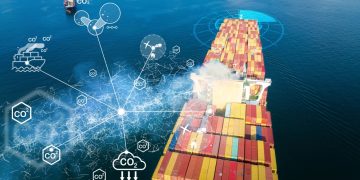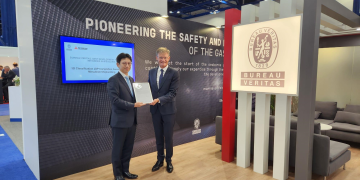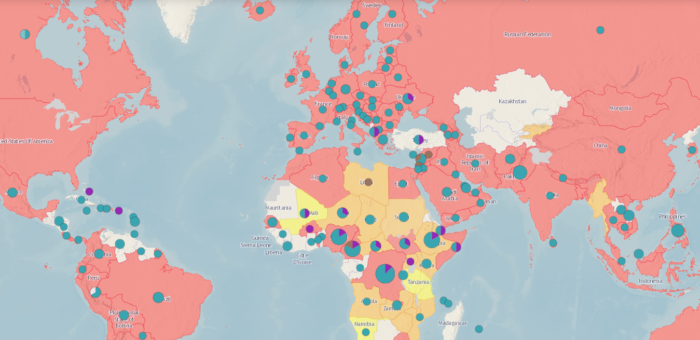The COVID-19 outbreak is an unprecedented crisis situation in terms of breadth and scale, from a global health, social and economic standpoint. The new coronavirus (COVID-19) has cost the lives of more than 5,431,000 while confirmed cases exceed 286,000,000. Although coronavirus started in China in early 2020, now it has spread all over the world, with the US accounting for the most deaths. Also, Europe, South America and India top the list with the regions affected significantly.
As of December 31st, 5,431,117 deaths have been reported. The US is the country with the most deaths (824,339) followed by Brazil with 619,249 and India with 481,080.
In order to provide a clear picture of where the new virus has been detected, as well as the number of fatalities, the Center for Systems Science and Engineering (CSSE) has created a live, interactive map, which depicts in real-time, the spread of the virus.
t
Coronavirus symptoms
For confirmed 2019-nCoV infections, reported illnesses have ranged from people being mildly sick to people being severely ill and dying. Symptoms can include:
- Fever
- Cough
- Shortness of breath
- Loss of taste or smell
- Tiredness
- Aches and pains
- Sore throat
CDC believes at this time that symptoms of 2019-nCoV may appear in as few as 2 days or as long as 14 after exposure.
How the virus spreads
It’s important to note that person-to-person spread can happen on a continuum, while the mutations of the virus have it made more contagious from human to human.
Through sneezing, coughing, or even talking loudly, particles can stay in the air or on surfaces, thus being transmitted person by person. For this reason, social distancing is recommended, and avoidance of closed spaces.
Prevention
The best way to prevent infection is to avoid being exposed to this virus. As a reminder, CDC always recommends everyday preventive actions to help prevent the spread of respiratory viruses, including:
- Wash your hands often with soap and water for at least 20 seconds. If soap and water are not available, use an alcohol-based hand sanitizer.
- Avoid touching your eyes, nose, and mouth with unwashed hands.
- Avoid close contact with people who are sick.
- Stay home when you are sick.
- Cover your cough or sneeze with a tissue, then throw the tissue in the trash.
- Clean and disinfect frequently touched objects and surfaces.
These are everyday habits that can help prevent the spread of several viruses.
However, vaccines are the ultimate hope for the eradication of COVID-19. As of 18 February 2021, different vaccines across several platforms have been rolled out in countries. Vulnerable populations in all countries are the highest priority for vaccination.
According to CDC, currently, three vaccines are authorized and recommended to prevent COVID-19:
- Pfizer-BioNTech: Based on evidence from clinical trials, the Pfizer-BioNTech vaccine was 95% effective at preventing laboratory-confirmed COVID-19 illness in people without evidence of previous infection.
- Moderna: Based on evidence from clinical trials, the Moderna vaccine was 94.1% effective at preventing laboratory-confirmed COVID-19 illness in people who received two doses who had no evidence of being previously infected.
- Johnson & Johnson’s Janssen: The J&J/Janssen vaccine was 66.3% effective in clinical trials (efficacy) at preventing laboratory-confirmed COVID-19 illness in people who had no evidence of prior infection 2 weeks after receiving the vaccine. People had the most protection 2 weeks after getting vaccinated.
AstraZeneca has also circulated another vaccine, which according to WHO has an efficacy of 63.09% against symptomatic SARS-CoV-2 infection. However, the use of the Oxford-AstraZeneca vaccine has been paused in a number of European countries after a small number of blood clots were reported among people who had recently had the jab.
Treatment
Recent guidelines on the treatment of COVID-19 recommend the use of tocilizumab in combination with dexamethasone in certain hospitalized patients who are exhibiting rapid respiratory decompensation due to COVID-19.
These patients are:
- Recently hospitalized patients who have been admitted to an intensive care unit (ICU) within the prior 24 hours and who require invasive mechanical ventilation, noninvasive mechanical ventilation (NIV) or high-flow nasal canula (HFNC) oxygen (>0.4 FiO2/30 L/min of oxygen flow) (BIIa);
- Recently hospitalized patients (not in an ICU) with rapidly increasing oxygen needs who require NIV or HFNC and have significantly increased markers of inflammation (BIIa).
In hospitalized patients with hypoxemia who require conventional oxygen therapy, the guidelines recommend using one of the following options:
- Remdesivir (BIIa);
- Dexamethasone plus remdesivir (BIII);
- Dexamethasone alone (BI).
People who think they may have been exposed to 2019-nCoV should contact your healthcare provider immediately.
How has COVID-19 affected shipping
Since the beginning of 2020, the world community has been under an unprecedented crisis facing uncertainty due to COVID-19 pandemic with the potential of the virus to change the history books. This could not leave ship operations out of the collateral damage.
1. Crew sign on/off shore leave
Crew changes may be under significant delays due to travel restrictions in different countries. As a matter of fact, up to 400000 seafarers have been trapped on board cargo ships during the Covid pandemic.
Problems may occur not only for seafarers travelling from specific countries of origin (e.g. a city of origin on lockdown) but also for all seafarers using as transit countries areas that have affected from the virus and also may be facing a possible quarantine upon arrival.
As far as practicable, operators should try to avoid crew changes in affected countries and use direct flights to avoid additional restrictions in arrival countries.
Shore leave is something to be considered, in the same context. In affected countries shore leave may be preferable to be suspended in order to avoid further implications of severe nature.
2. Seafarer repatriation
Most of the above restrictions are applicable to this issue also. Challenges may occur in case a seafarer after disembarkation for repatriation is put to quarantine in the airport for any reason. Full assistance should be provided by local agents in order to ensure that these seafarers will finally depart for their home destination.
4. Delays due to Pilot shortage/refusal to board
There are two aspects of this issue. One is the reduced number of pilots available due to virus infection and the other is the refusal of the pilot to board the vessel due to her previous port schedule (visiting ports in affected countries). Both issues are important and may cause delays or changes to ship’s schedule.
However, operators during voyage planning stage should ensure through local agents that pilot will be available upon ship’s arrival and in accordance with port regulations. Additional delays due such causes should be documented for future use.
See also
10 ways that COVID-19 has disrupted shipping
Practicing a growth mindset during the COVID-19 crisis
From “pandemic” to “infodemic”
More states designate seafarers as key workers
Protecting seafarers’ health during COVID-19: What can ship operators do?


































































The EPA purposed regulations (public comments except in october 2020 on federal register) that stated their intent was to remove many best management practices (BMP) for the shipping industry to mitigate the spread of virus and invasive species in ballast water, including common sense issues such as the shipping industry should try and avoid ballast uptakes around sewage outflows and known hot spots of pathogens. It is also known that SARS, covid-19 can be a risk entering the aquatic environmental to human health. Sadly main stream media dose not ever mention ballast water spreading disease, despite documentation of 10,000 dead in South America from ballast water induced cholera during the 1990’s.
Because main stream media purposely dose not ever mention the problem and the public is left clueless the shipping industry will never adequately address the problem no matter how many die.